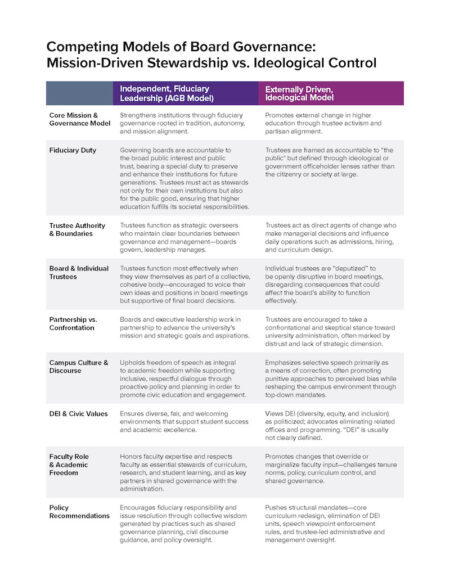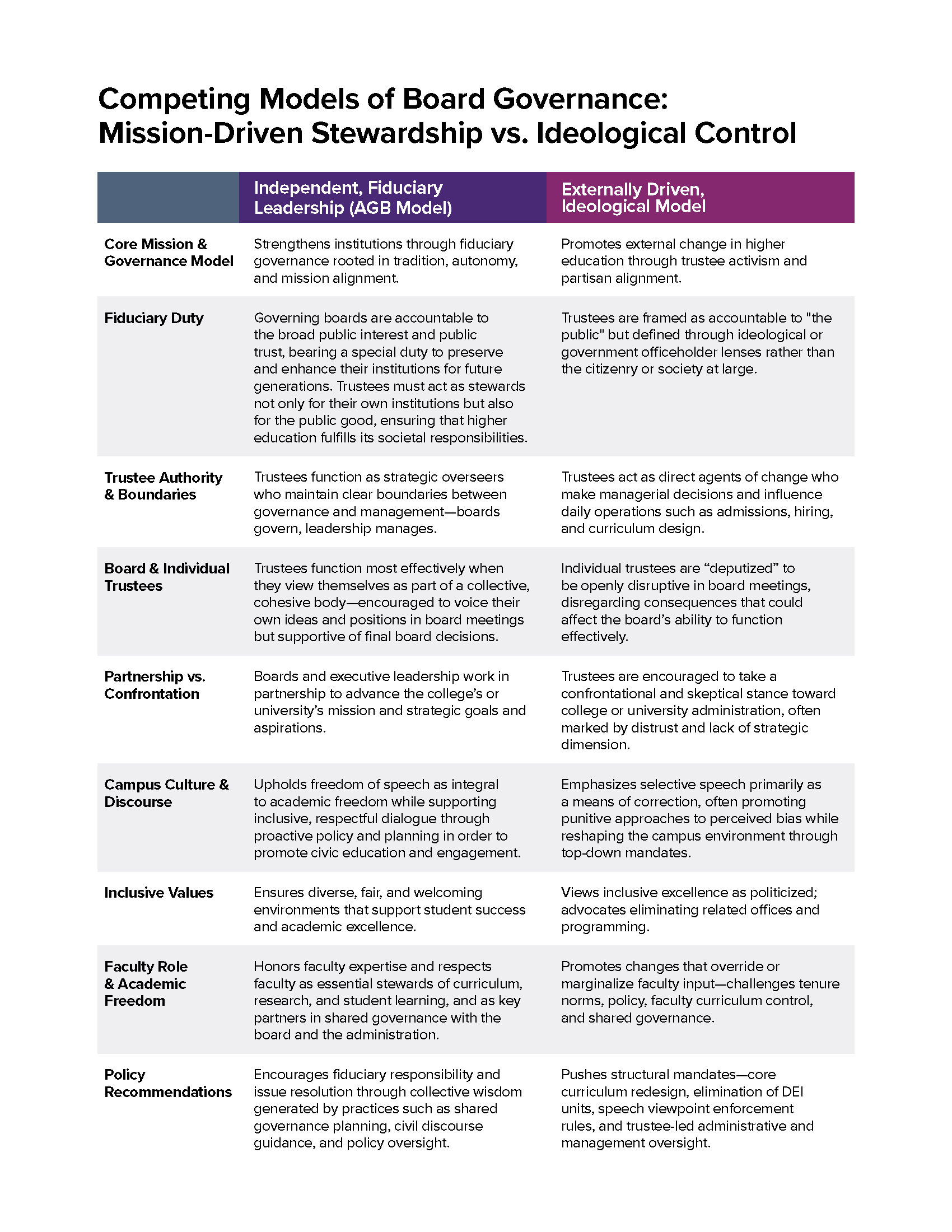
For more than 100 years, the Association of Governing Boards of Universities and Colleges (AGB) has served as the trusted source for advancing the U.S. model of higher education governance. Our approach is grounded in legal and fiduciary responsibility, academic integrity, and institutional autonomy—developed through a century of research, experience, and collaborative leadership with governing boards, college and university chief executives, and scholars across the country.
AGB’s guidance is informed by decades of successful practice and expertise, not partisan strategy. We believe that governing boards should act with integrity as stewards of mission and public trust, not as ideological operatives. We emphasize partnership, accountability, and independence—cornerstones of the governance model that has helped make U.S. higher education the gold standard worldwide for research, creativity, innovation, and education.
Today, however, we face a rising tide of efforts to advance externally driven reform agendas and recast trustees as partisan operatives. These ideologically driven governance models undermine institutional stability, erode public trust, and diminish merit-based successes. Ultimately, they will curb critical thinking skills, jeopardize educational quality, and threaten the independent self-governance of colleges and universities.
This side-by-side comparison highlights the critical differences between these two visions—and the consequences they carry.
Competing Models of Board Governance: Mission-Driven Stewardship vs. Ideological Control
Core Mission & Governance Model
Independent, Fiduciary Leadership (AGB Model)
Strengthens institutions through fiduciary governance rooted in tradition, autonomy, and mission alignment.
Externally Driven, Ideological Model
Promotes external change in higher education through trustee activism and partisan alignment.
Fiduciary Duty
Independent, Fiduciary Leadership (AGB Model)
Governing boards are accountable to the broad public interest and public trust, bearing a special duty to preserve and enhance their institutions for future generations. Trustees must act as stewards not only for their own institutions but also for the public good, ensuring that higher education fulfills its societal responsibilities.
Externally Driven, Ideological Model
Trustees are framed as accountable to “the public” but defined through ideological or government officeholder lenses rather than the citizenry or society at large.
Trustee Authority & Boundaries
Independent, Fiduciary Leadership (AGB Model)
Trustees function as strategic overseers who maintain clear boundaries between governance and management—boards govern, leadership manages.
Externally Driven, Ideological Model
Trustees act as direct agents of change who make managerial decisions and influence daily operations such as admissions, hiring, and curriculum design.
Board & Individual Trustees
Independent, Fiduciary Leadership (AGB Model)
Trustees function most effectively when they view themselves as part of a collective, cohesive body—encouraged to voice their own ideas and positions in board meetings but supportive of final board decisions.
Externally Driven, Ideological Model
Individual trustees are “deputized” to be openly disruptive in board meetings, disregarding consequences that could affect the board’s ability to function effectively.
Partnership vs. Confrontation
Independent, Fiduciary Leadership (AGB Model)
Boards and executive leadership work in partnership to advance the college’s or university’s mission and strategic goals and aspirations.
Externally Driven, Ideological Model
Trustees are encouraged to take a confrontational and skeptical stance toward college or university administration, often marked by distrust and lack of strategic dimension.
Campus Culture & Discourse
Independent, Fiduciary Leadership (AGB Model)
Upholds freedom of speech as integral to academic freedom while supporting inclusive, respectful dialogue through proactive policy and planning in order to promote civic education and engagement.
Externally Driven, Ideological Model
Emphasizes selective speech primarily as a means of correction, often promoting punitive approaches to perceived bias while reshaping the campus environment through top-down mandates.
Inclusive Values
Independent, Fiduciary Leadership (AGB Model)
Ensures diverse, fair, and welcoming environments that support student success and academic excellence.
Externally Driven, Ideological Model
Views inclusive excellence as politicized; advocates eliminating related offices and programming.
Faculty Role & Academic Freedom
Independent, Fiduciary Leadership (AGB Model)
Honors faculty expertise and respects faculty as essential stewards of curriculum, research, and student learning, and as key partners in shared governance with the board and the administration.
Externally Driven, Ideological Model
Promotes changes that override or marginalize faculty input—challenges tenure norms, policy, faculty curriculum control, and shared governance.
Policy Recommendations
Independent, Fiduciary Leadership (AGB Model)
Encourages fiduciary responsibility and issue resolution through collective wisdom generated by practices such as shared governance planning, civil discourse guidance, and policy oversight.
Externally Driven, Ideological Model
Pushes structural mandates—core curriculum redesign, elimination of DEI units, speech viewpoint enforcement rules, and trustee-led administrative and management oversight.
Why This Matters: U.S. Higher Education at a Crossroads
The independent, mission-centered governance model—practiced and promoted by AGB for over 100 years—has made American higher education the envy of the world, admired for its diversity, academic freedom, innovation, and resilience. The balance of institutional autonomy and board oversight has enabled U.S. colleges and universities to become global leaders in research, enrollment, and impact.
By contrast, ideologically driven governance models—seen in other countries where boards serve government agendas—have led to instability, erosion of academic freedom, and loss of public trust. When trustees become agents of external ideology rather than guardians of mission, institutions risk becoming battlegrounds rather than centers of learning.
This is more than a governance debate—it’s a defining moment for the future of higher education. Will our institutions be led by independent stewards committed to mission and excellence or by partisan surrogates driven by short-term ideology? The consequences will echo for generations.
CHECKLIST: Does Your Board Govern with Integrity—or Ideology?
Core Mission & Governance Model
- Our board consistently focuses on the institution’s mission as the guiding principle for decision-making.
- Our board explicitly rejects partisan or ideological agendas that are not consistent with mission fulfillment, institutional norms, or long-term sustainability.
Fiduciary Duty
- All trustees understand and practice their duties of care, loyalty, and obedience.
- Board decisions reflect a long-term view of promoting sustainability and public trust.
- Trustees act as stewards of the public trust and understand their role in advancing the public good through higher education.
- The board rejects efforts to redefine “the public” as a narrow ideological audience.
- The board reinforces fiduciary education during orientation and through ongoing development.
Trustee Authority and Boundaries
- Trustees act as strategic partners—not managers or ideological agents.
- Trustees are equipped to engage in high-level policy, planning, and oversight.
- Trustees respect institutional expertise and collaborate with leadership appropriately.
Board and Individual Trustees
- Trustees understand that they serve as part of a collective body and not as individual actors with separate agendas.
- All trustees are encouraged to speak openly during board discussions but commit to publicly supporting final board decisions.
- Individual trustees do not use their role to grandstand, disrupt proceedings, or pursue personal or partisan aims.
- Board culture encourages respectful disagreement and unified commitment once a decision is made.
- Board leaders proactively address behaviors that undermine cohesion or institutional trust.
Partnership vs. Confrontation
- The board approaches the president and senior leadership as partners in advancing institutional goals.
- Trustees engage in critical questioning without adopting a tone of hostility or distrust toward campus leadership.
- Board discussions are strategic in nature—not focused on micromanaging or “catching” leadership in errors.
- A culture of mutual respect and shared purpose exists between the board and administration.
- Tensions or disagreements are addressed professionally, with a focus on the institution’s mission and long-term success.
Campus Culture and Discourse
- The board supports freedom of speech as a foundation of academic freedom and democratic education.
- The board promotes inclusive, respectful dialogue across differing viewpoints—not just tolerance but genuine civic engagement.
- Campus climate discussions are framed as opportunities for learning, inclusion, and growth rather than control or punishment.
- Board-level policies around campus culture are designed to enable inquiry and participation, not to restrict or censure expression.
- Trustees understand that fostering civil discourse is a long-term leadership responsibility, not a tool for ideological correction.
Inclusive Values
- The board views inclusive excellence, defined as ensuring diverse, fair, and welcoming environments, as mission-aligned and integral to student success.
- Trustees support the civic role of higher education and democratic participation.
Faculty Role and Academic Freedom
- Faculty stewardship of curriculum and research is respected.
- The board understands and protects academic freedom and faculty consultation.
- Board policies ensure faculty play a key role in shared governance.
Shared Governance
- The board embraces shared governance as essential to institutional credibility, resilience, and advancement.
- The board engages faculty, administration, and students in decisions of strategic importance.
- The board recognizes the primacy of faculty leadership in matters of curriculum, academic progress, and student assessment.
Policy Recommendations
- The board uses structured tools (such as scenario planning, board workshops, and stakeholder engagement) to address complex issues.
- The board uses structured tools (e.g., scenario planning, board workshops, stakeholder engagement) to address complex issues.
- The board seeks to understand underlying drivers of challenges before proposing structural solutions.
- Trustees avoid mandates that override institutional expertise or bypass faculty, administration, or shared governance bodies.
- Civil discourse and mission alignment guide approaches to hot-button or politically charged topics.
Take the Next Step: Strengthen Your Board’s Commitment to Mission-Aligned Governance
If your board’s responses to the checklist signal areas of concern, you’re not alone—and you’re not without support. AGB’s time-tested approach to higher education governance is built on more than a century of collaboration with governing boards like yours. Whether your board is seeking to recalibrate its role, re-center around fiduciary principles, or navigate partisan governance challenges, AGB is here to help you lead with confidence and integrity.
AGB Can Help Your Board:
» Clarify and recommit to fiduciary responsibilities
» Reinforce the line between governance and management
» Restore board unity and build a culture of trust
» Address disruptive behaviors or partisan interference
» Strengthen shared governance and strategic leadership capacity
Get Support Now
- Connect with AGB Membership:
Explore board development resources and peer learning.
membership@AGB.org - Request Governance Consulting:
From workshops to board assessments, AGB’s experts are ready to guide your board.
consulting@AGB.org - Explore Our Resources and Tools:
Visit: AGB.org/GovernNOW
Better Governance Begins Today
Your board has the power—and the responsibility—to model the principles that define U.S. higher education leadership. Don’t wait for a crisis. Invest in your board’s strength and your institution’s future.
Let AGB help you govern with clarity, insight, courage, and mission fidelity.


